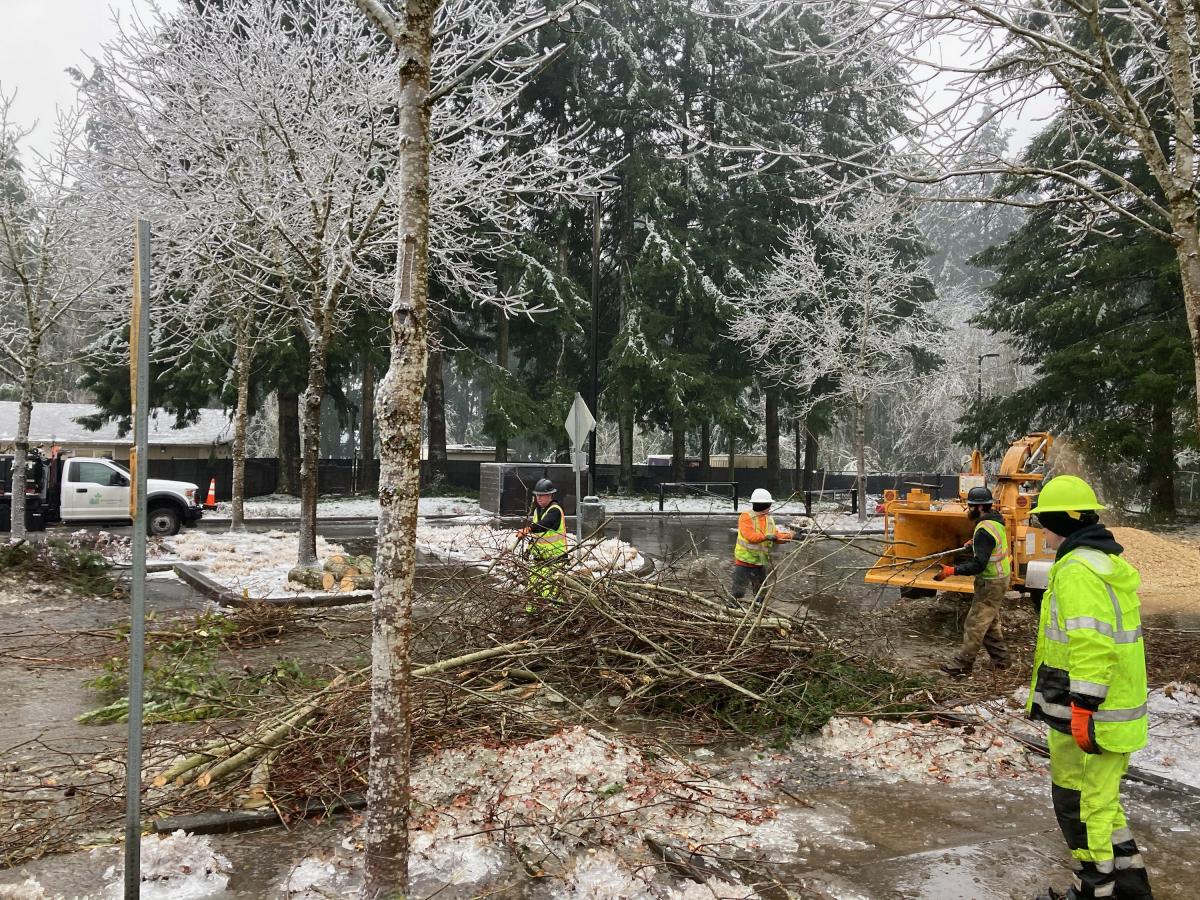Extreme Winter Weather Resource Guide

When extreme winter weather is forecast, including freezing temperatures, snow, sleet, and excessive wind, take precautions, remain indoors as necessary and limit vehicle travel when road conditions are icy.
Extreme cold can by lethal when proper precautions are not taken. When temperatures fall below freezing (32 degree), those at greatest risk illness include vehicle operators, adults over the age of 65 and/or living alone, and those unequipped for a loss of electrical power.
Closures/Changes in City Operations
To be posted here as needed
City Snow and Ice Control Plan
When extreme winter weather arrives, the City's response is guided by its Snow and Ice Control Plan. In the event of snowfall, the City plows major arterials and collectors (map included within plan). Within residential areas, snow removal is coordinated by HOAs where they are present, while property owners are responsible for clearing ice and snow from sidewalks adjacent to their property.
Stay Warm at the Wilsonville Library
The Wilsonville Library, 8200 SW Wilsonville Rd., invites residents to escape the cold during business hours. When it is deemed necessary, the Library extends its operating hours to provide temporary shelter for those in need of a warm, indoor setting.
Library hours:
- Monday - Thursday: 10 am - 8 pm
- Friday - Saturday: 10 am - 6 pm
- Sunday: 1-6 pm
Several other locations within Washington County and Clackamas County typically offer extended hours to accommodate people in need of shelter, including overnight stays. A map provided by Washington County details indoor/outdoor spaces available for public use. Additional information for the tri-county area may be found at 211info.org.
Preparing for Weather Events is Critical
In the wake of the devastating 2021 ice storms, it’s easy to recall just how quickly severe winter weather can wreak havoc. Winter storms can include the loss of power, the inability to drive to the grocery store, frozen water pipes, an internet outage and/or other not-so-fun surprises.
With preparation, households can more easily withstand the unexpected. Consider taking a few basic precautions when extreme winter weather is in the forecast:
- Update your emergency kit to include fresh non-perishable food, medicines, and 14 gallons of water on hand for every household member. That’s a gallon a day for two weeks.
- Buy/charge battery operated cell phone chargers, which may be your best way to communicate with the outside world should your power and/or internet fail. Have several, and make sure they hold a full charge.
- Keep tools to remove and/or mitigate ice and snow, including snow shovels, salt or other de-icing agent, car ice scrapers, as well as snow boots, gloves and ear coverings. Never start your vehicle in a closed garage. Avoid unnecessary travel, and when you must travel, keep blankets and emergency supplies in your vehicle.
- Keep your pipes from bursting in sub-freezing temperatures by covering exposed outdoor pipes, insulating basements, crawl spaces, attics and other spaces in unheated interior areas. Letting water drip from faucets helps prevent freezing.
- Sign up for emergency messaging from Public Alerts at clackamas.us/dm, and check the National Weather Service or local media for up-to-date forecasts.
- If your home gets too cold for you to sleep safely, don’t risk it. Never use outdoor heaters, ovens or BBQ grills for indoor heat; use only heaters built for indoor use. Seek shelter at a local warming center; call 211 to get information about shelters and other resources.
- If you’re stuck inside your home and need critical assistance, put a sign on a front door or in your window. When emergency responders are canvassing neighborhoods, they can heed your call for help.
- Check in on neighbors who live alone and/or who might require extra assistance. Your preparation can go a long way in helping others less prepared.
Event Schedule Disruptions
When necessary, City events may be canceled or postponed. Check here for details when necessary.
Receive Emergency Alerts
The PublicAlerts.org website, which offers additional tips for withstanding extreme heat, is maintained by the Portland Bureau of Emergency Management and the Regional Disaster Preparedness Organization on behalf of the region. Partner agencies contribute to content.
PublicAlerts allows people to opt-in to receive emergency notifications by text, email, or voice message. This could include information about power outages, evacuation notices and other critical information.
- Sign Up to Receive Alerts:
Winter Driving Reminders
Winter driving can be treacherous, offering hazards like skidding off the road, an unexpected collision, or getting stranded in the freezing cold. The consequences of getting stuck without proper preparation can be severe. Having the right equipment and knowing what to do is a game changer during a winter emergency — especially if your vehicle is immobilized and help is slow to arrive. It is essential to have an emergency preparedness kit in your vehicle, especially if you frequently drive at night and/or log considerable hours behind the wheel.
Useful items for your kit include:
• First aid kit
• Enough water and non-perishable food for 48-72 hours.
• Extra layer of clothing
• Flashlight with batteries
• Matches or a lighter
• Small shovel or ice scraper
• Extra phone charger or battery
• Flares or cones
Remember to regularly inspect and restock your car kit so that everything works and is ready when you need it most. Having the kit is just the first step. To truly enhance your safety during a winter emergency, it is wise to know what to do if you find yourself stranded.
Here are tips to guide drivers trapped in their vehicle during a winter emergency:
• Stay in the vehicle for protection from the harsh conditions outside.
• Make the vehicle visible with flares, flashers, colored cloth tied to the antenna, or cones.
• Call 911 when possible; wait for assistance.
• Ensure your vehicle’s exhaust pipe isn’t blocked to prevent carbon monoxide poisoning.
• Keep fresh air flowing in your vehicle by cracking a window.
• Stay warm using the extra layer of clothing or blanket from your emergency kit.
• Conserve cell phone battery by only using it when necessary.
• Turn on the vehicle intermittently for heat to conserve battery and fuel.
Resource Links
- National Weather Service Forecast l Weather.com 10-day forecast
- ODOT Tripcheck Road Conditions Map
- 211 Severe Weather Resources
- Power Outage Information: Canby Utility l Portland General Electric
- Locate Warming Centers: Clackamas County l Washington County
- Shelters: Washington County
- Sign up to receive Public Alerts: Clackamas County l Washington County





